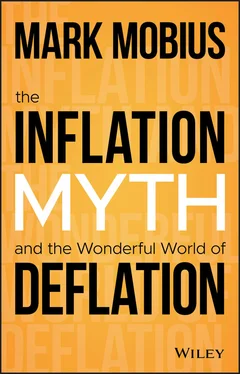Finally, incomes in currency terms or the buying power of consumers change continuously, and, in fact, for most of history, they have tended to match price increases.Therefore, although it may seem that inflation is taking place for some products and services, they are actually getting cheaper in terms of the earning power of the consumer.
If you take all of the above together I am sure you will agree with me that our understanding of inflation is to say the least flawed. I would even go a step further: In my opinion the concept of inflation is a myth, a legend, a fable, and, yes, a falsehood for a number of reasons. What we are experiencing today is, in fact, a deflationary spiral driven by innovation and automation. This deflationary phenomenon is here to stay and will continue to improve our standard of living. Welcome to the wonderful world of deflation!
1 1http://www.klenow.com/internet‐rising‐prices‐falling_Goolsbee_Klenow.pdf.
Special thanks to Anna von Hahn who gave invaluable help in editing this book and helping me to clarify many points. I would also like to thank my publisher, especially Gladys Ganaden for taking such excellent care of The Inflation Myth during the publication process. My books have always been in the best possible hands at Wiley. Last but not least, appreciation to Kelly Falconer for her great performance as my agent and also to Graeme Falconer for his support.
Mark Mobius is a founding partner of Mobius Capital Partners. Previously he was executive chairman of the Templeton Emerging Markets Group and spent over 30 years investing in emerging markets all over the world. He received a PhD from the Massachusetts Institute of Technology. Mark is on the International Finance Corporation's Economic Advisory Board and served on the World Bank's Global Corporate Governance Forum as co‐chairman of its Investor Responsibility Task Force. Mark is the author of several books including: Invest for Good (2019); The Little Book of Emerging Markets (2012); Passport to Profits (1999/2012); Mobius on Emerging Markets (1996); The Investor's Guide to Emerging Markets (1994); Equities, An Introduction to Core Concepts (2006); Bonds, An Introduction to Core Concepts (2012); and Mutual Funds, An Introduction to Core Concepts (2007).
www.markmobius.com
My interest in inflation was piqued when in 2007 Argentina's director of consumer pricing, Graciela Bevacqua, at the INDEC, the official statistics agency, was fired for not being willing to falsify her agency's inflation statistics to satisfy the government led by President Cristina Fernández de Kirchner. The situation became a global incident when the International Monetary Fund (IMF) gave a report on Argentina to the IMF board which could have resulted in the country being censured and expelled from the IMF. The official Argentine data reported inflation at 10%, while independent data provided by as many as nine private agencies indicated that inflation was actually more than double that at between 25% and 30%. The government's efforts to keep the numbers low and fool the public were in response to rising prices that had resulted in mass protests against the Kirchner government. When IMF Chair Christine Lagarde said that if Argentina did not start producing reliable statistics, she would give the country a “red card,” Kirchner – speaking at the UN General Assembly – said: “Argentina is not a soccer team, it's a sovereign country and accepts no threats or pressures… In the game of comparing football with economics and politics, let me say that the President of FIFA has been far more successful and satisfactory than that of the IMF Executive Board.” 1(Of course, that was before the FIFA Board was found to be engaged in rampant corruption.) In 2007, the Kirchner government not only dismissed Graciela Bevacqua, but also fined her and charged her with embezzlement. Graciela spoke out and claimed that her superiors had asked her to delete decimals from the inflation calculations. The American Statistical Association protested the persecution its colleague was facing in Argentina, but to no avail. Graciela was replaced. More of that case later.
“I do not think it an exaggeration,” the economist Friedrich Hayek once wrote, “to say that history is largely a history of inflation…” 2Price rises can be witnessed around the world, as indicated by Germany's Weimar Republic hyperinflation in the early 1920s, the inflation of Eastern Europe following the collapse of the Berlin Wall in 1989, the stagflation of many Western countries in the 1970s, and the inflation that Japan witnessed following the end of the economic miracle in the 1960s.
It's important for us to look at the consequences of such information flows regarding “inflation,” “deflation,” “hyperinflation,” etc. and what are the effects on decision‐making not only in governments but also in business and investment. We want to look at the impact of inflation/deflation statistical information flows and how they can be so misleading.
Importance of Inflation Numbers
Ever since the earliest price indices were first introduced at the start of the eighteenth century, the measurement of inflation and attempts to control its growth have become increasingly salient. After the Second World War, full employment was seen as one of the major goals of economic policy. Then, over the next forty years, price stability took its place as the primary economic aim of governments and central banks. As mentioned previously, it was Ronald Reagan in the 1980s who described the threat of inflation as being “…as violent as a mugger, as frightening as an armed robber and as deadly as a hitman.” 3Showing the priorities of modern governments, in 1991 the then British Chancellor, Norman Lamont, told the House of Commons that: “… rising unemployment and the recession have been the price that we have had to pay to get inflation down. That price is well worth paying. That focus on keeping inflation down remains at the heart of monetary policy.” 4
Central banks around the world are charged with keeping inflation at an agreed rate. For example, in the UK each year, the Chancellor of the Exchequer writes to the Governor of the Bank, confirming what the inflation target is. Should the inflation rate deviate from this target by more than 1%, the Governor must write to the Chancellor, explaining why the inflation target has been missed and what steps the Bank is going to take to rectify the situation.
Price instability is, of course, not just an issue for governments. For investors, information regarding the rate of inflation plays an important part in deciding where they put their money. Rising levels of inflation supposedly reduce the value of savings and investment unless interest rates and returns on investment keep pace. This has an impact on everyone – from those with savings in a bank account, to where pension funds are being invested.
At the center of the Bank of England is a small courtyard garden, which is the preserve of the incumbent governor. Originally, the garden was a graveyard. When the Bank moved to Threadneedle Street in 1734, it soon expanded to take over the church next door which was subsequently deconsecrated and demolished. However, the decision was taken to leave the graveyard there. In the 1920s and 1930s, when the Bank needed rebuilding again, the Garden Court was dug up to reveal several coffins, one of which was the curiosity of William Jenkins. Jenkins worked at the Bank in the late 1700s, was 6 feet 7 inches tall, and was buried in the Garden Court as his friends were worried that his body might be stolen and sold. Such was the size of Jenkins’ coffin that when it was moved to Nunhead Cemetery, it had to be placed in the catacombs as it was too long for the vaults.
Читать дальше












